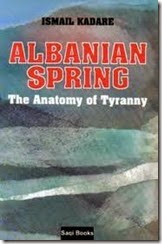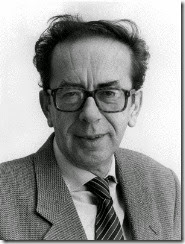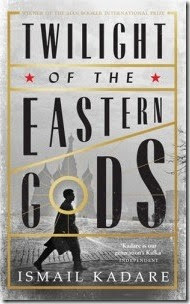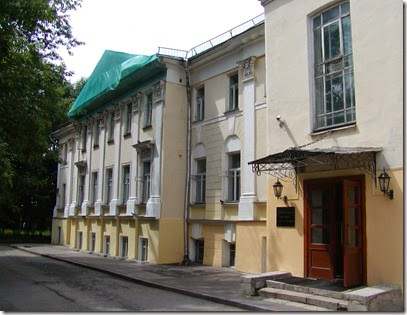Am I a gangster or murderer?
Of what crime do I stand
Condemned? I made the whole world weep
At the beauty of my land.
– Boris Pasternak from ‘Nobel Prize’
This is both an old and an odd book. The copyright says 1978 but its origins date back to 1961 which is when the short story ‘A Summer in Dubulti’ which forms the basis of the first of this novel’s five chapters appeared in print, although the events described date back to the late fifties. Other fragments followed over the next fifteen years which Kadare assembled and buried within a collection along with two other pieces, but even there what was published was not the book I’ve just read. In 1981 a French translation came out and Kadare, according to the English translator David Bellos, “used this opportunity to smuggle back into the novel some of the more forthright passages about girls that had been omitted from the Albanian ‘original’” but please be assured this is no Lady Chatterley’s Lover (which was published in 1959); if memory serves me right our young protagonist has sex once (maybe twice) and there’re no titillating accounts of his night-time gymnastics. Here’s one of the racier bits (or maybe the only racy bit):
Without waiting for a response from her sister [who wants to go for walk in the woods], she took my hand and pulled me towards her bedroom …
Shocking, what? The French version was revised in 1998 and what Canongate has just published is an English translation of that version, not a direct translation from the Albanian. This has been the case with all the novels that are available in English; seven of which that I’m aware of having been handled by Bellos.
In the west we’re so used to freedom of speech that’s it’s really hard to imagine a world where a sentence like that would have to be smuggled into a novel. Maybe in the 1880’s but in the 1980’s? The simple fact is that even today people are being thrown into prison for expressing their opinions on paper. What’s amazing about Kadare is how he managed to survive all these years under the Hoxha regime. It’s not been by kow-towing but it has been by biding his time and picking his battles. So we’ve had to wait a long time to read about Kadare’s youthful experiences at the Gorky Institute of World Literature and how Russia reacted to Pasternak’s being awarded the Nobel Prize. Was it worth the wait? Not really. Now so much is known about the USSR that this is very old news. This doesn’t mean it’s not worth reading but now it’s an historical document. Had it been published in the sixties (even if it had to be smuggled out of Albania and only appeared in the west) people would’ve  sat up and paid attention. The 1965 film adaptation of Doctor Zhivago was a spectacular box office hit. Can you imagine how people would’ve responded had they learned just how Russia reacted when they learned one of their own was to be awarded the Nobel Prize primarily for this novel although his nomination had been on the cards for years? Even fifty years on it’s upsetting.
sat up and paid attention. The 1965 film adaptation of Doctor Zhivago was a spectacular box office hit. Can you imagine how people would’ve responded had they learned just how Russia reacted when they learned one of their own was to be awarded the Nobel Prize primarily for this novel although his nomination had been on the cards for years? Even fifty years on it’s upsetting.
But then maybe you don’t know. To be honest I didn’t. The information’s all in Wikipedia. It’s no big secret. But I doubt many people know the full story. Not that we get the full story here. What we get are Kadare’s protagonist’s experiences and, to be honest, he’s a bit too interested in his lacklustre love life to worry about poor old Boris Pasternak and his troubles. He’s astute enough to realise, however, that Pasternak has only two options: refuse the prize or get on a plane to Stockholm and not expect to be allowed back into the country:
On the radio from five a.m. until midnight, on television, in newspapers and magazines and even in children’s comics, the renegade writer was being splattered with venom. As was customary in cases of this kind, the bristling statements of Soviet literati were regurgitated by workers and collective farmers. Newspapers apologised for being able to publish only a minute proportion of the tens of thousands of letters and telegrams pouring in from the four corners of the Soviet lands. Among them were expressions of outrage from oil drillers, drama students, Orthodox priests, Bolshoi ballerinas, mountain climbers, atomic physicists, beekeepers, Caspian Sea salt-rakers, reformed mystics, the mute and so forth. […] Most of the students on our course had also sent in statements and expected to see them in print in due course. One of them was […] Maskiavicius, even though he’d told me the previous day that Pasternak, despite his turpitude, was worth a hundred times more than any of the other runts of Soviet literature.
The thing is Kadare is not a Russian writer. He’s an Albanian and so can view events with some detachment. Being an Albanian may mean little to you or me (most of us couldn’t point to Albania on a map of the world) but there are certain countries around the world where national identity is a big thing, a really big thing, and Albania is one of them. I discovered this when I reviewed the first novel of Kadare’s that I read, The Ghost Rider. It’s a very important novel, too, even though it’s actually a retelling of an old folk tale, the legend of Kostandin and Doruntine. He references it several times in Twilight of the Eastern Gods but unless you’re an Albanian (or have read The Ghost Rider or at the very least my review of the book) its significance will slip by you.
During the fifties young Albanian students were often sent to educational establishments in the Soviet Union and Eastern Europe. Soviet aid was generous in those years. But by the late fifties the relationship between the USSR’s new rulers and the Communist leader of Albania, Enver Hoxha (a diehard Stalinist), were cooling and we see evidence in Kadare’s book where the young man’s called to his country’s embassy:
[W]e were urged to limit, as far as we could, all relations with Muscovites for the time being. ‘I mean especially young female Muscovites…’ he added. My heart sank, not so much from what the counsellor had just said but from his having said it without a shadow of a smile. […] ‘You will therefore have to stop dating them,’ he went on, in what sounded to me like a weary voice. He spoke for two more minutes, stressing that relations between the two countries were good, telling us not to be unnecessarily alarmed and especially not to mention any of this to anyone.
Not that the boy pays a blind bit of attention to that advice but then he’s young and stupid. Stupid as far as women goes but in all other respects he can see the writing on the wall.
Possibly the most striking section in the book is where he takes on the mantel of Dante and describes the various floors on the Gorky Institute:
First floor: that’s where the first-year students stay; they’ve not yet committed many literary sins. Second floor: critics, conformists, playwrights, whitewashers. Third … circle: dogmatics, arse-lickers and Russian nationalists. Fourth circle: women, liberals and people disenchanted with socialism. Fifth circle: slanderers and snitches. Sixth circle: denaturalised writers who have abandoned their own language to write in Russian…
In an interview when asked if he was happy during his stay at the institute Kadare responded:
"Yes. Very happy."
But then he catches himself as though he might have given the wrong impression. "I was happy… as a human being. But I was none the less aware that I was in a college that was somehow twisted. The Gorky Institute was a factory for conformist, dogmatic writers and, because I understood that, I was saved."
In his Paris Review interview he expands on what he means here when he says he was “saved”:
At the institute I was disgusted by the indoctrination, which in a way saved me. I kept telling myself that on no account must I do what they taught me but the exact opposite. Their official writers were all slaves of the party, except for a few exceptions like Konstantin Paustovsky, Chukovsky, Yevtushenko.
I understand completely where he’s coming from. I recently watched a documentary about the seventies in the UK and it really was a miserable time as far as the country was concerned but I was young and so wrapped up in my own life and loves that I really was only vaguely aware of the bigger picture. In the same interview Kadare admits:
"There was a classmate I had a relatively long affair with—but then I decided it was not the fashion." I think he means that personal attachment was viewed as anti-Communist. "Long-term relationships were considered out-of-date. One's friends and classmates were the real enemy—it was worse than having the police on your tail! Especially in Moscow. They would say, 'Are you still with that girl there? Time to change!' And I think it's the greatest failure of my life that I dropped girls that I liked because comrades told me to. It was complete madness."
Learning this we can see that the narrator of the novel is not Kadare even if some of the events in the book are (for example, his chancing upon a manuscript copy of part of Doctor Zhivago days before the furore broke out). Our young protagonist spends most of the book pining over a lost love, Lida, in fact during the chapter where the vilification of Pasternak comes to its head he’s probably more upset by the fact Lida’s dumped him and taken up with a fellow student called Stulpanc. The fault there lies squarely with him because in a drunken stupor—it seems college students are the same the world over—he handed over her phone number having decided he wanted to have nothing to do with her. All very childish.
The problems really started for Kadare, of course, when he returned to Albania. Hoxha unsettled the literati when he sided with the upcoming writers when a dispute with the old guard arose which was a clever move because he was in effect putting down a deposit on their allegiance and forming his own nomenklatura who in time he expected to function in exactly the same way as Stalin has expected the writers, artists and composers of his day to behave, as mouthpieces of the state and not of the individual artist. So Kadare has had to tread carefully over the years. Referring to The Great Winter, a 1977 novel in which he portrayed Hoxha in a somewhat flattering light, Kadare said the book was "the price he had to pay for his freedom" although when you look at the book it’s obvious he’s using broad strokes; the official response was neither lavish praise nor prohibition. It was published, yes, but he did get his knuckles rapped later on: in 1975 Kadare's privileged position ended with the publication of ‘The Red Pashas’, a poem which satirized Albania's inefficient bureaucracy. He was subsequently forced into internal exile in a small central Albanian village and forbidden to publish his works; the ban lasted for three years. Kadare’s responses to questions posed by Ben Naparstek are worth reading but are a bit long to reproduce here.
 In 1991, when the coast was clear and he could speak his mind (he’d sought political asylum in France by this time), Kadare wrote, in Albanian Spring: The Anatomy of Tyranny:
In 1991, when the coast was clear and he could speak his mind (he’d sought political asylum in France by this time), Kadare wrote, in Albanian Spring: The Anatomy of Tyranny:
A writer is the natural enemy of dictatorship. […] Dictatorship and literature and only exist together as two wild beasts that have each other by the throat. Each […] is capable of wounding the other in different ways. The writer’s wounds seem horrible because they come at once. But those the writer inflicts on dictatorship are like a time bomb, and they never heal.
One has to wonder what good Kadare would’ve done had be somehow managed to get Twilight of the Eastern Gods published at the time. Look what happened to Pasternak. Kadare had to undergo similar with regard to his books The Winter of Great Solitude [an earlier version of The Great Winter] and The Palace of Dreams. So why stay? For the same reason Pasternak chose to decline the Nobel Prize. He wrote to Khrushchev:
I cannot conceive of my destiny separate from Russia, or outside it. Whatever my mistakes or failings, I could not imagine that I should find myself at the centre of such a political campaign as has been worked up round my name in the West. Once I was aware of this, I informed the Swedish Academy of my voluntary renunciation of the Nobel Prize. Departure beyond the borders of my country would for me be tantamount to death and I therefore request you not to take this extreme measure with me.
This is how Kadare feels about being Albanian. But he was in it for the long haul. There have been seemingly braver writers: On October 5, 1953, the writer Kasëm Trebeshina wrote an open letter to Hoxha criticising the obsession with socialist realism shared by the Party and the Writers' Union. His predictable reward was seventeen years in gaol and only since the fall of Communism has his work begun to appear in print in Albania. In the Paris Review interview Kadare responds:
From 1967 to 1970 I was under the direct surveillance of the dictator himself. Remember that, to the great misfortune of the intellectuals, Hoxha regarded himself as an author and a poet and therefore a “friend” of writers. As I was the country’s best-known writer, he was interested in me. In such a situation I had three choices: to conform to my own beliefs, which meant death; complete silence, which meant another kind of death; or to pay a tribute, a bribe. I chose the third solution by writing The Long Winter.
All of this leaves me with mixed feelings. What would I have done? I’m certainly not a brave man but I’d be genuinely interested to learn how many truly brave men (and women, of course) there are out there. I think we like the idea of bravery just as we like the ideas of honesty and decency and all the rest. Or maybe it’s heroism we like the idea of and actual bravery—here I am referencing Huxley once more—is “pretty squalid” when compared with how we see bravery portrayed in films, TV shows and even newscasts. Is Kadare’s approach so different to that of, say, Shostakovich who, following his second denunciation, found himself having to compose three categories of work: film music to pay the rent, official works aimed at securing official rehabilitation, and serious works "for the desk drawer"? His response to the first you might recall was the Fifth Symphony with its subtitle, "An artist's creative response to just criticism".
It’s too late now to change what happened in Russia and Albania. It’s probably too late to stop what’s happening in China and Mexico right now. But the Twilight of the Eastern Gods is a valid—although not the most significant—contribution to the world literature that underlines the belief that freedom of speech should be an absolute human right. The evidence is growing. It was a shame what Pasternak went through but what would be a real shame is that he went through it and nothing ever changed. That said, this is not Kadare’s best work although it has its moments. It might have been realistic to include all the romance (for want of a better word) but it does take away from the momentous events going on all around him and yet strangely enough I felt short-changed on both counts.
Other reviews of Kadare’s book by me:
***
 Ismail Kadare was born in 1936 in Gjirokastër, in the south of Albania. He studied in Tirana and Moscow, returning to Albania in 1960 after the country broke ties with the Soviet Union. He is known for his novels, although he was first noticed for his poetry collections. He stopped writing poems in the 1960s and focused on short stories until the publication of his first novel, The General of the Dead Army. From 1963 he has been a novelist. In 1996 he became a lifetime member of the Academy of Moral and Political Sciences of France. In 1992, he was awarded the Prix mondial Cino Del Duca; in 2005, he won the inaugural Man Booker International Prize and in 2009 the Prince of Asturias Award of Arts. He has divided his time between Albania and France since 1990. He began writing very young, in the mid-1950s but published only a few poems. His works have been published in about thirty languages.
Ismail Kadare was born in 1936 in Gjirokastër, in the south of Albania. He studied in Tirana and Moscow, returning to Albania in 1960 after the country broke ties with the Soviet Union. He is known for his novels, although he was first noticed for his poetry collections. He stopped writing poems in the 1960s and focused on short stories until the publication of his first novel, The General of the Dead Army. From 1963 he has been a novelist. In 1996 he became a lifetime member of the Academy of Moral and Political Sciences of France. In 1992, he was awarded the Prix mondial Cino Del Duca; in 2005, he won the inaugural Man Booker International Prize and in 2009 the Prince of Asturias Award of Arts. He has divided his time between Albania and France since 1990. He began writing very young, in the mid-1950s but published only a few poems. His works have been published in about thirty languages.



No comments:
Post a Comment